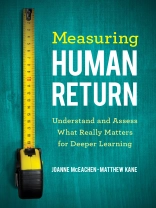Measure what matters for deeper learning
Getting at the heart of what matters for students is key to deeper learning that connects with their lives, but what good is knowing what matters without also understanding how to bring it to life? What does it really take to know who students are, what they are truly learning, and why?
Measuring Human Return solves this dilemma with a comprehensive, systematic process for measuring deeper learning outcomes. Educators will learn to assess students’ self-understanding, knowledge, competencies, and connections through vignettes, case studies, learning experiences and tools. The book helps readers:
- Develop key system capabilities to build the foundation for sustainable engagement, measurement, and change
- Discover five comprehensive ‘frames’ for measuring deeper learning
- Engage in the process of collaborative inquiry
- Commit to the central, active role of learners by engaging them as partners in every aspect of their learning
Discover how to take an authentic, formative, and inquiry-driven approach to measuring the outcomes that drive deeper learning.
The book really hits the mark. The best thing about it is the in-depth discussion of systems. It is with great pleasure that I read and re-read this book. It delivers a good combination of big vision with specific strategies and techniques.Jeff Beaudry, Professor, Educational Leadership;
University of Southern Maine; Portland, ME
This is just what we need in our district. This engaging book will help Change Teams support their systems to effectively measure deeper learning. Readers will be drawn in by great examples from around the globe of educators putting students first. This energizing book calls us to take action for all of our students today and for our future.
Charisse Berner, Director of Teaching and Learning, Curriculum;
Bellingham Public Schools; Bellingham, WA
Зміст
Preface: The Depth of Humanity
Part I. Capable Systems of Change
1. FROM SURFACE TO DEEP
Deeper Learning in a Changing World
A Comprehensive Measurement Framework
The State of the System
Assumption-Shatterers
2. SYSTEM CAPABILITIES
Shifting Priorities
System Capability 1: Understanding Your System
System Capability 2: Engaging Learners, Parents, and Communities as Real Partners
System Capability 3: Identifying and Measuring What’s Important
System Capability 4: Leading for Deep and Sustainable Change
System Capability 5: Creating a Culture of Learning, Belonging, and High Expectations for All
3. THE CHANGE TEAM PROCESS
Collective Cognition for Collaborative Change
An Inquiry Approach
Final Reflections on Part I
Part II. Five Frames of Measurement
4. ENGAGING PARTNERS AROUND WHAT MATTERS
Engage, Empower, and Transform
Composing an Evaluative Snapshot
Identifying and Describing What Matters
Breaking Down Deeper Learning
5. DEVELOPING MEASURES OF DEEPER LEARNING
Authentic Measures and a System of Tools
Measuring Self-Understanding, Connection, and Competency
Capability and Practice Tools
Developing Measures in Individual Contexts
6. FINDING CLARITY IN DEPTH
Riding the Wave
Language Development
Establishing System Alignment
Final Reflections on Part II
Part III. Authentic Inquiry Practice
7. PROFESSIONAL LEARNING AND INQUIRY
Drilling Down Into Inquiry
Making Sense of Assessment Evidence
Engaging in Professional Inquiry
8. INQUIRING INTO OUTCOMES
Assessing and Measuring Student Outcomes
Designing Authentic Assessments
9. DEEPER LEARNING EXPERIENCES
Practice Applies
A Celebration of Learning and Practice
No Interrupting the Flow
10. COLLABORATIVE MODERATION
Measuring and Sharing Learning and Practice
Exemplars, Evidence, and Inter-Rater Reliability
Final Reflections on Part III
Conclusion: How Deep Are You?
Glossary
References
Index
Acknowledgments
About the Authors
Про автора
Matthew Kane is the Director of Research and Writing at The Learner First, where he focuses on the role and experiences of school systems in developing the learning outcomes that contribute to lifelong success, connect us with one another, and make a difference in our communities. He has partnered with diverse schools and school systems globally to develop deeper learning tools, language, and practices, and he works as a senior project manager with the New Pedagogies for Deep Learning (NPDL) global partnership. Matthew graduated from the University of Notre Dame and lives in Seattle, Washington.












